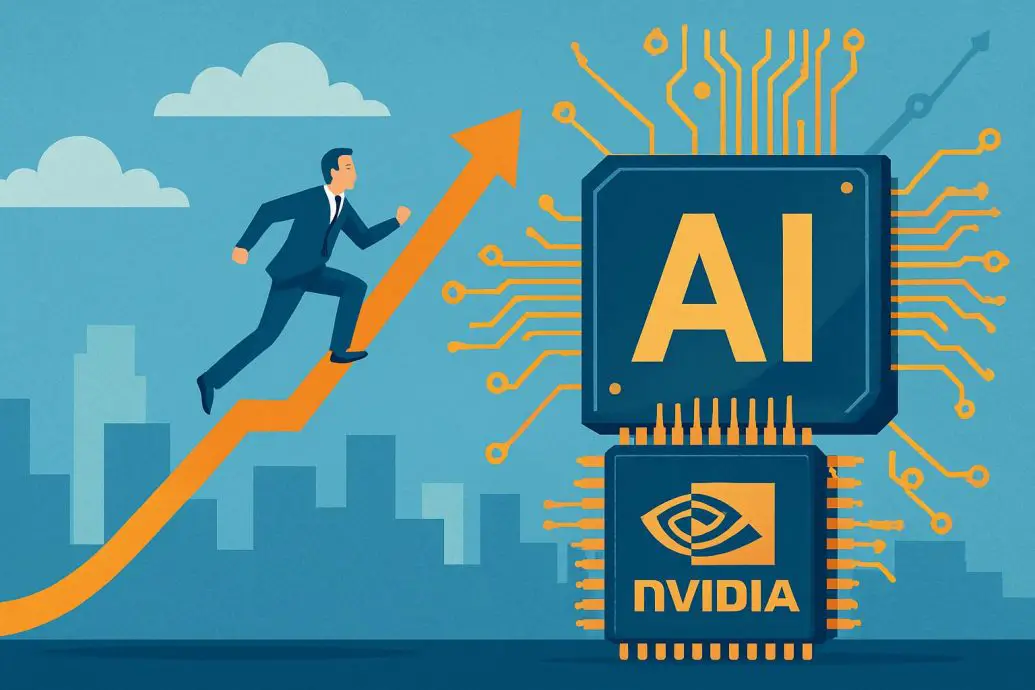Nvidia Surges as AI Chip Leader
Nvidia is surging as the clear leader in artificial intelligence hardware, solidifying its dominance through exceptional financial results and rapidly growing global demand. Backed by strategic investments from governments and strong investor confidence, Nvidia’s trajectory is reshaping financial markets, geopolitics, and global technology. CEO Jensen Huang has seen his personal wealth skyrocket, joining the world’s wealthiest tech figures. This article examines how Nvidia’s innovation, alignment with government priorities, and forward-thinking strategy are defining the future of AI chip leadership.
Key Takeaways
- Nvidia is recognized as the top manufacturer of AI chips, driving impressive gains in revenue and market value.
- CEO Jensen Huang’s net worth is nearing $120 billion, placing him among the world’s richest tech leaders.
- Government support, especially from Saudi Arabia, is boosting Nvidia’s international role in semiconductor advancements.
- Nvidia stands at the intersection of technological progress and national strategic interests.
Also Read: Jensen Huang Advocates AI as Global Infrastructure
Table of contents
The AI Chip Boom Fueling Nvidia’s Ascent
Nvidia’s global rise is directly connected to the explosive growth of artificial intelligence across industries. The company has led the way in developing custom chips designed for machine learning, large language models, and fast data processing. Its most recent earnings report exceeded expectations, reflecting robust demand for AI chips centered on data centers and high-performance systems.
Bloomberg reports that Nvidia’s earnings surge pushed its stock to new highs, growing its market capitalization beyond $2.8 trillion. Analysts attribute the performance to Nvidia’s GPU architecture, which continues to outperform alternatives for AI workloads.
Also Read: Surging Demand for Cybersecurity Innovation Explained
Jensen Huang: From Engineer to Tech Titan
As Nvidia scales up, Jensen Huang has gained notable prominence. His net worth is approaching $120 billion, surpassing other tech entrepreneurs including Michael Dell. CNBC ranks Huang among the ten wealthiest individuals in the tech sector.
Huang’s rise can be traced back to his engineering background and early commitment to neural network computing. He remains active in product design and regularly presents Nvidia’s upcoming innovations during public keynotes. His leadership style, focused on long-term vision and direct involvement, has made him influential in both business and technology circles.
Global Race for Chips: A Strategic Dimension
Nvidia’s strength is not limited to chip design. Governments around the world are investing heavily in semiconductor infrastructure to enhance national security and technological independence. Saudi Arabia stands out, with plans to invest billions in chip manufacturing as part of a broader effort to assert control over key technologies. These initiatives go beyond economic gains, reflecting national strategies to shape the global technology landscape.
As the Financial Times outlines, many of these initiatives align well with Nvidia’s interests. The company benefits from local partnerships and improved supply chains, allowing it to respond to rising demand even more effectively. In this context, Nvidia becomes more than a hardware supplier; it becomes a strategic resource for national development and digital infrastructure.
Nvidia’s Place in the AI Economy
Artificial intelligence is now central to industries from transportation to medicine. Across all these areas, the need for powerful chips that support parallel workloads is growing. Nvidia has taken the lead with its CUDA ecosystem and high-performance tensor cores, making its GPUs an industry standard. Despite efforts by competitors such as AMD and Intel, Nvidia maintains a significant technological edge.
The Verge emphasizes Nvidia’s robust product roadmap, which includes the upcoming Blackwell chips designed to accelerate large language model training. Through partnerships with Amazon Web Services, Microsoft Azure, and Google Cloud, Nvidia is deeply integrated into enterprise ecosystems. It has become more than a chipmaker by establishing itself as a comprehensive AI platform provider.
Also Read: SoundHound AI and Quantum Computing Surge
Billionaire CEOs Riding the AI Wave
Jensen Huang’s wealth reflects the broader trend among tech leaders whose fortunes are rising due to AI advancements. Elon Musk, Satya Nadella, and Sundar Pichai have also seen significant gains from AI programs within their organizations. Huang is unique in that Nvidia enables the foundational technologies powering others’ platforms.
Thanks to Nvidia’s rapid stock appreciation, Huang has now overtaken Michael Dell in Bloomberg’s wealth tracking. Investor confidence remains high, with few signs of selling pressure. As demand for AI infrastructure grows, Nvidia’s revenue is likely to rise further, supporting Huang’s continued climb among the world’s richest individuals.
Also Read: Nvidia CEO Predicts Robotics Breakthrough Soon
What’s Next for Nvidia?
Nvidia appears well-positioned for continued growth. Analysts forecast that developments in generative AI, smart robotics, and intelligent infrastructure will fuel long-term chip demand. Nvidia is moving forward with innovations in edge inference, quantum integration, and vertical-specific AI software targeted at healthcare, logistics, and more.
Countries such as the United States and Saudi Arabia are expanding funding initiatives, offering Nvidia a range of new collaboration opportunities and the resources needed for production scale. Given its unique technical leadership and strategically neutral position, Nvidia may become even more critical amid global competition in chip manufacturing, especially between the US and China.
Experts agree that Nvidia’s rise is sustained not just by market timing but by a thoughtful approach to product design, government partnerships, and long-term market needs. As artificial intelligence continues to reshape industries and infrastructure, Nvidia is likely to remain at the center of the global computing environment.
